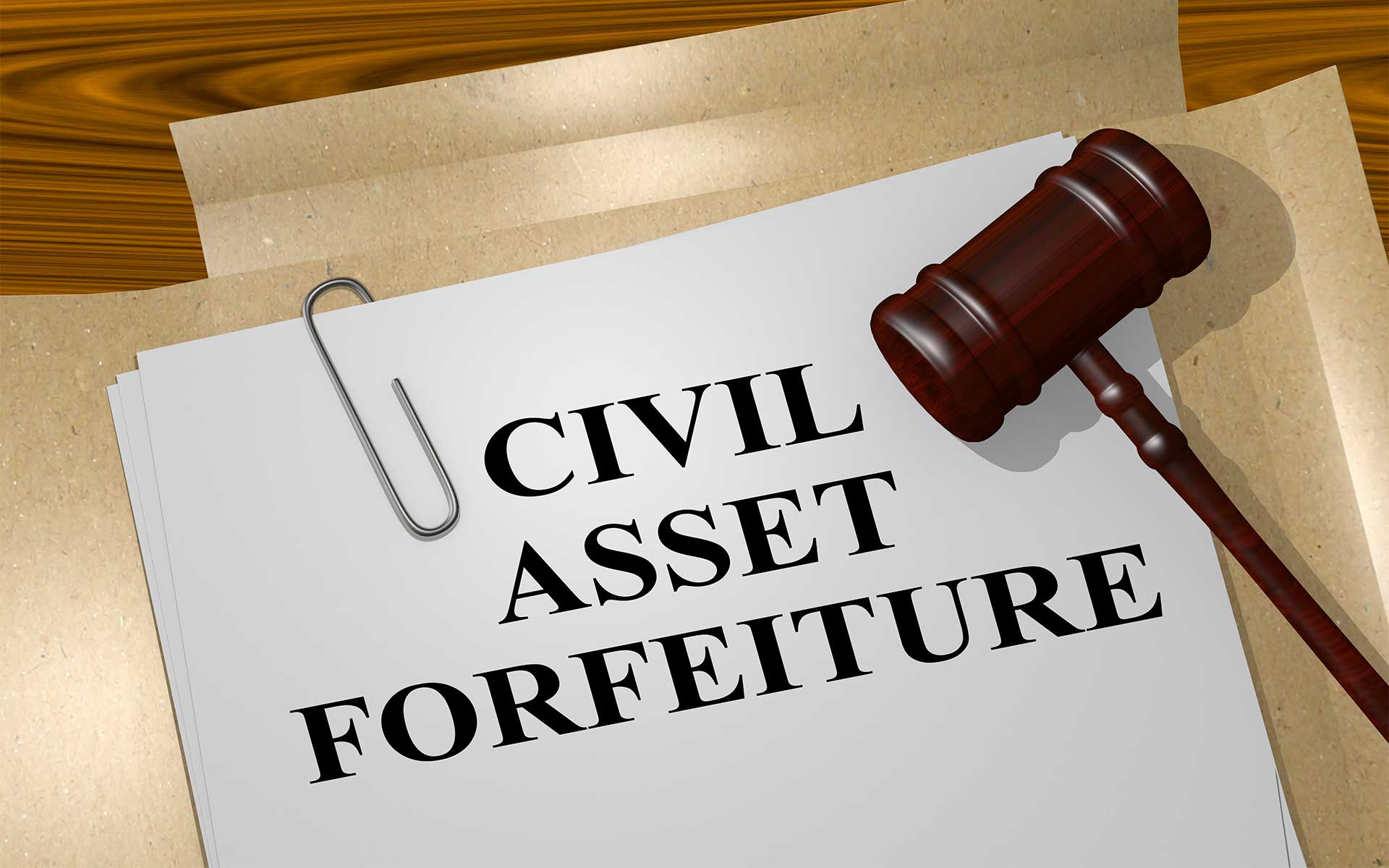
Much controversy surrounds Texas asset forfeiture laws, often referred to as policing for profit, especially in cases of civil asset forfeiture. While intended to help law enforcement dismantle criminal enterprises by seizing assets linked to illegal activity, Texas asset forfeiture laws have faced growing criticism for overstepping property rights and due process.
The debate around asset forfeiture laws is not limited to Texas, as law enforcement agencies nationwide praise the practice for its effectiveness in combating crime. However, critics everywhere disagree, arguing that it can lead to civil injustices and abuse, particularly in civil asset forfeiture cases where individuals face no criminal charges.
What is Civil Asset Forfeiture?
According to Chapter 59 of the Texas Code of Criminal Procedure, law enforcement can confiscate property suspected of being involved in criminal activity without charging the owner with a crime. Property under these circumstances can include cash, real estate, vehicles, and other property assets. The motivation behind civil asset forfeiture Texas law is to deprive criminals of the proceeds of their illegal activities and disrupt criminal enterprises.
What is an Example of a Civil Asset Forfeiture Case?
Let’s examine a Texas civil asset forfeiture incident from January 2016 that occurred in Harris County. In this case, the Houston police seized $955 during a routine traffic stop because they suspected he was selling painkillers found in his car during the stop. Police said the man was a gang member with a criminal history. Yet, prosecutors discovered that the man had a valid prescription for the drugs, so they dropped the possession charge. However, the man’s $955 was never returned and likely ended up in the accounts of the police department and local prosecutor.
What are the Differences Between Civil and Criminal Texas Asset Forfeitures?
There are distinct differences between Texas civil asset forfeiture and criminal asset forfeiture, specifically involving legal proceedings.
Civil Asset Forfeiture
Texas civil asset forfeitures are cases against the property, not the owner. In these cases, the state must prove by a “preponderance of the evidence” (i.e., more likely than not) that the property is connected to criminal activity. According to civil asset forfeiture laws in Texas, no criminal charges or convictions are required against the property owner for law enforcement to seize the property. Additionally, property owners are not entitled to a court-appointed attorney, so they must hire legal representation if they wish to contest the forfeiture. Although the law is intended to disrupt criminal enterprises and deprive them of resources, law enforcement agencies often retain a portion of the proceeds from forfeited assets, even when no cause is justified, creating potential conflicts of interest.
Criminal Asset Forfeiture
In these Texas asset forfeiture proceedings, the case is against the individual and is part of a criminal prosecution. Therefore, the state must prove beyond a reasonable doubt that the individual committed a crime and that the property connects to that crime, justifying the asset forfeiture. The defendants (i.e., property owners) are entitled to legal representation, including a court-appointed attorney if they cannot afford one, as part of the criminal defense. If a conviction occurs, the forfeited assets or proceeds typically go to the general state or federal funds, reducing potential law enforcement agency conflicts of interest.
Criticisms of Civil Asset Forfeiture

Civil asset forfeiture laws in Texas are heavily criticized for their potential to infringe on individual property rights and due process, prompting calls for reform. Following are the main criticisms of the Texas civil asset forfeiture law:
Due Process Infringement
Property owners typically have overwhelming difficulty contesting Texas asset forfeiture cases. They are not entitled to a court-appointed attorney, making it difficult and expensive to fight the forfeiture.
Motivation for Profit
Because law enforcement agencies can “legally” keep a large portion of the forfeited property proceeds, critics argue that the law incentivizes law enforcement to prioritize revenue over justice.
Disproportionately Impacts Specific Audiences
Critics (and some evidence) suggest that Texas civil asset forfeiture unduly affects low-income individuals and specific races.
Arguments for Civil Asset Forfeiture
Advocates for Texas civil asset forfeiture will argue that the practice has several benefits, including these main points.
Disrupts Criminal Activity/Operations
Advocates believe that seizing assets purportedly linked to illegal activity helps disrupt the financial operations of criminal enterprises, i.e., reducing the motivation to engage in unlawful activity by removing the economic incentive for crime.
Financial Support for Police and Prosecutors
The assets seized through forfeiture can provide significant financial support for law enforcement agencies, allocating the money to police training, equipment, and other needs, reducing reliance on taxpayer dollars.
Supports Action Against High-Value Targets
Advocates often position Texas civil asset forfeiture as a tool to go after the wealth and assets of prominent criminals and organizations that might otherwise be difficult to prosecute or convict. Basically, the law gives police officers a pass to seize assets from “high-value criminals” even if they don’t have enough evidence to charge a person with a crime.
How to Challenge Criminal Asset Forfeiture in Texas
Under Texas asset forfeiture law, criminal forfeiture is final after the court issues an order permanently stripping the defendant of ownership, which can only occur following a conviction. Therefore, property owners are entitled to a hearing to prove the property was not used in or obtained through criminal activity. If they can show by a preponderance of evidence that the property is unrelated to a crime, they may recover it.
The following circumstances can support a property owner’s challenge of criminal asset forfeiture laws in Texas:
Innocent Owner
You were unaware that someone else used your property to commit a crime.
Lack of Criminal Connection
You can demonstrate that the property was not used in the commission of a crime.
Prior Ownership
Your property cannot be associated with illegal activity because it was acquired before you allegedly committed the crime.
How A Texas Asset Forfeiture Defense Attorney Can Help You Prepare for Court

Asset forfeiture often happens to good people caught in bad situations. Unfortunately, Texas asset forfeiture law can result in permanently losing property even when no criminal charges materialize or prosecutors fail to get a conviction. Therefore, victims of this type of law enforcement must aggressively fight for their property’s return, and a Texas asset forfeiture defense attorney, like those at GHC Law in Austin, can help. Our attorneys are skilled in fighting Texas asset forfeitures, offering the support needed to fight for the justice you deserve. Here’s how we can help:
Evaluate Your Case
We will assess the details of your case, reviewing the circumstances of the Texas asset seizure, the legal basis for forfeiture, and the evidence against you, identifying weaknesses in the prosecution’s argument while determining if your rights were violated during the seizure.
Explain the Legal Process
Asset forfeiture laws are complex, so we will guide you through the legal procedures, explaining how Texas asset forfeiture works, including what to expect at each stage of the process.
Build a Strong Defense
We will help gather evidence and witnesses to support your claim that the seized property was not used in criminal activity.
Challenge the Burden of Proof
In civil asset forfeiture cases, the state must prove a connection between the property and criminal activity by a preponderance of evidence so we can challenge and work to show that the evidence is insufficient to justify forfeiture.
Prepare for the Hearing
We will help you prepare for the court hearing, ensuring you understand the arguments, evidence, and possible outcomes while also handling courtroom procedures and representing you in negotiations with the prosecution.
Negotiate Settlements
In some cases, we can negotiate with the state to return your property or reach a settlement that avoids lengthy court battles.
Our Asset Forfeiture Services
Expert Legal Representation
We offer skilled representation to challenge the seizure and fight for the return of your property.
Detailed Case Analysis
Our team conducts a thorough analysis of your case to identify legal and procedural errors in the forfeiture process.
Aggressive Defense
We advocate strongly on your behalf, whether through negotiations with prosecutors or litigating in court.
Comprehensive Support
From initial seizure to final resolution, we provide continuous support and guidance, ensuring you understand your rights and options.
Texas asset forfeiture is a deeply heated issue that has many divided. Despite Texas asset forfeiture legislation around reformation, the controversies over the law continue. Unfortunately, this does not help the citizens who are losing property under the law’s efforts. If you find yourself in the middle of a Texas asset forfeiture situation with local or federal law enforcement, call the offices of GHC Law for help. We will help you fight for the justice you deserve every step of the way.
Contact the Texas asset forfeiture defense attorneys at GHC Law Firm today!
Our goal is to safeguard your assets and defend your rights against unlawful or overreaching forfeiture actions.
Contact us to schedule a consultation and learn how we can assist you with asset forfeiture cases.


